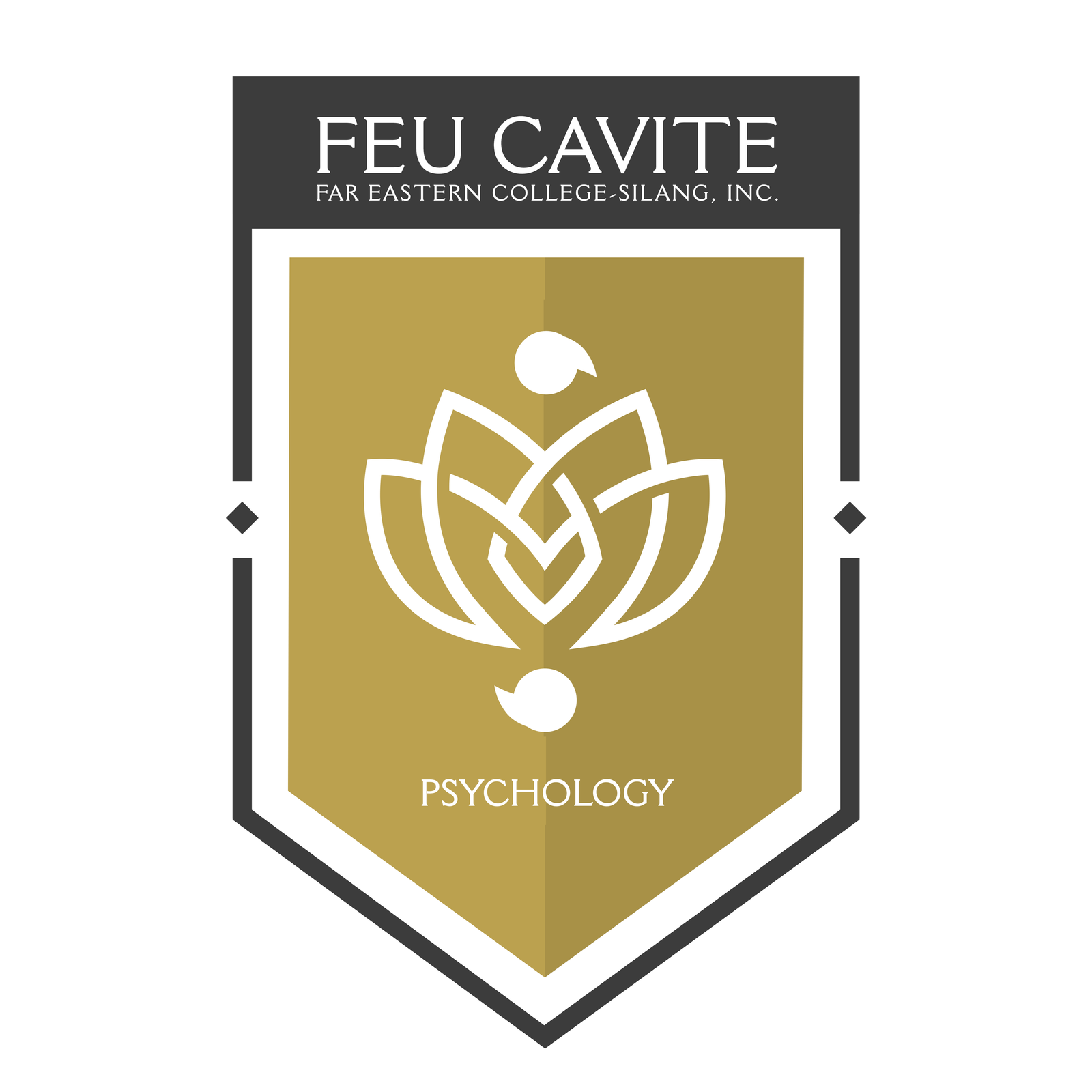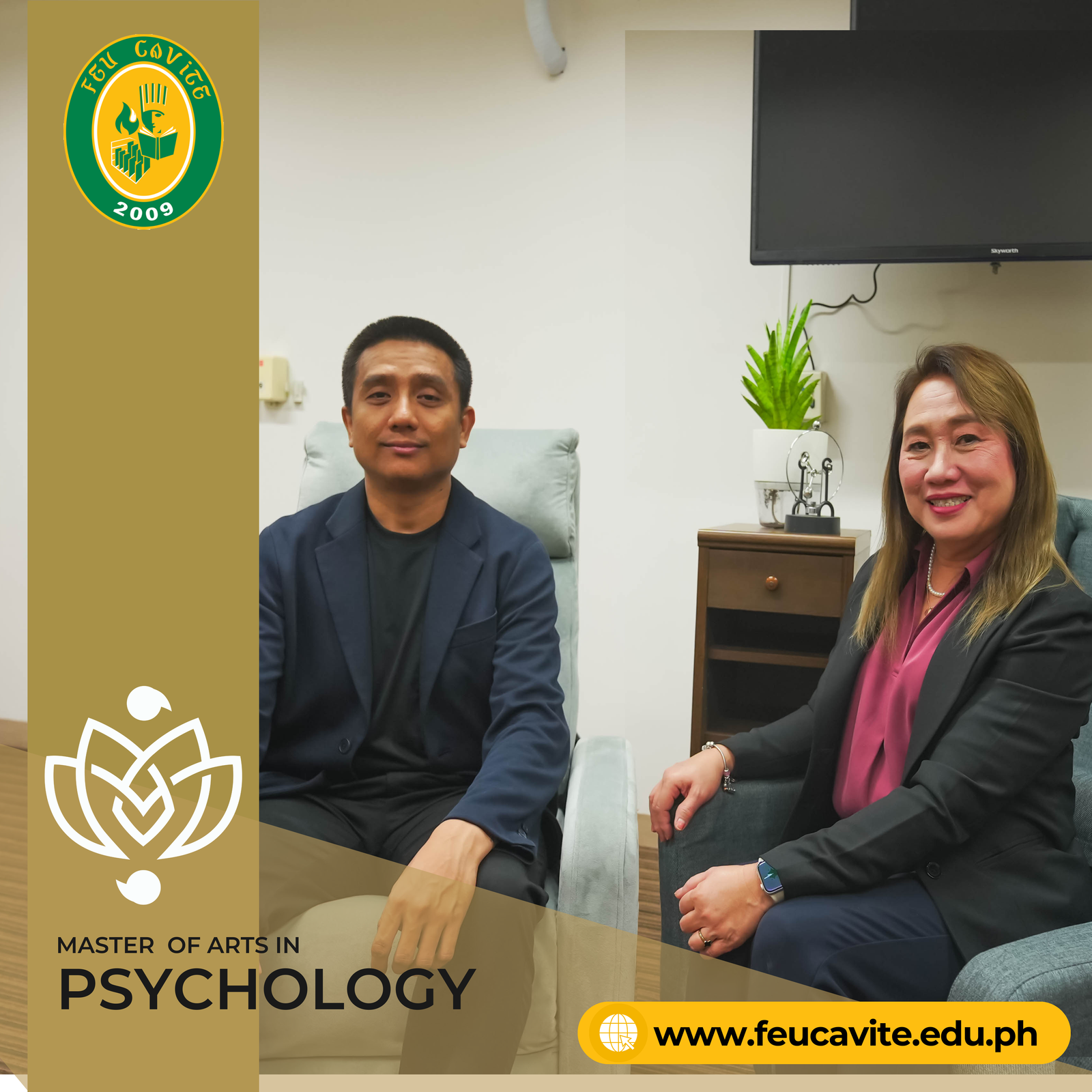Department of Psychology

Master of Arts in Psychology
(FEU Manila extension program)
Ms. Maylene H. Ocampo, MAPsy, CFRA, CHIIS, CAMD
Department Chair
Office Location
Department Chair’s Office, Basement of HED Building
Contact Number
TEL: (046) 419 8500 loc. 216
E-mail
mocampo@feucavite.edu.ph
Master of Arts in Psychology ( Specialization : Clinical Psychology ; Industrial Psychology) is a 45 – unit graduate program with thesis which aims to provide graduate students with high level training in teaching, research and professional practice in psychology with emphasis on high level of specialization in the field of psychology. (CMO 39, s2010). Specifically, graduates of the master of arts program are trained to do high level academic work in psychology as practitioners and researchers as well as to be specialists in the practice of psychology within their field of specialization.
Master of Arts in Psychology is designed to prepare graduate students for leadership positions in the fields of industrial, clinical and mental health professions and other related areas for professional advancement, economic upliftment and social responsibility . The program puts premium on building competence in the field of Psychology through strong foundations in theoretical knowledge and research – based applications.
The Psychology graduate programs prepare students to be competitive graduates who are sufficiently trained in the industrial, clinical, and/or educational settings to occupy positions in top companies, psychological centers or clinics to cater to the needs of their clientele. The program enables students to recognize that learning is a lifelong and self – motivated process adhered with the core values of FEUC (Fortitude, Excellence, Uprightness and Compassion), which will help them to become reflective practitioners with a deep sense of commitment, and who possess professional integrity, excellent behaviors and moral conduct.
Under the current curriculum, Master of Arts (Specialization : Clinical Psychology ; Specialization: Industrial Psychology) is comprised of 1, 782 hours of course work, including the 300 hours of field work or practicum. Students are required to take and pass written comprehensive exam before moving to thesis writing 1 and 2. To meet the requirements in the completion of graduate program, students must pass the final oral defense and publish their thesis.

Program Objectives
- To produce competitive leaders in the industry, highly skilled mental health practitioners and effective educators through rigorous and vibrant training and skill development in the graduate school.
- To undertake innovative researches that will help in the advancement and enrichment of the different fields in psychology.
- To develop socially and environmentally responsible, morally upright and career – driven psychologists.
- To establish network and linkages with fellow psychologists both local and international.
- To develop service-oriented psychologists committed to establishing the optimum psychological well-being of the community guided by the ethical practice of the profession.
Program Expected Learning Outcomes
The MA Psychology program aims to expand the student’s knowledge, skills, expertise , and practice in psychology, thus enabling them to:
1. Apply psychological concepts and theories in the analysis of psychosocial issues;
2. Design and execute psychological research using appropriate approaches and methods;
3. Practice professional and highest ethical standards in the fields of psychology such as in the clinical and industrial settings;
4. Exemplify professional attributes and actively engage in lifelong learning undertakings, and
5. Exhibit collaborative and leadership skills.;
6. Acquire higher level competencies through post-graduate education in Psychology or employment advancement in Clinical and Industrial-Organizational setting.
Career Pathways
Master of Arts in Psychology (with Specialization in Clinical Psychology or Specialization in Industrial Psychology) opens a wide range of professional career paths for our learners, preparing them for dynamic, global work environments in the different fields of psychology such as clinical, forensic and industrial settings. These career pathways include:
- Registered / Licensed Psychologist
- Clinical Psychologist
- Industrial/ Organizational Psychologist
- Counseling Psychologist
- Mental Health Practitioner
- Educator
- Researcher
- Human Resource Specialist/ Generalist
- Chief Executive Officer (CEO)
Program Features
A in Psychology is a 45 – unit program divided into three areas: coursework, internship/ practicum and research.
There are 18 units of course work which are equivalent to nine (9) courses namely: For Master of Arts in Psychology (Specialization: Industrial Psychology) , Advanced Industrial / Organizational Psychology, Systematic Psychology, Advanced Theories of Personality , Training and Development, Advanced Psychological Assessment, Human Resource Management, Seminar on Filipino Psychology , Ethics in the Workplace and Organizational Psychology and to choose 1 elective from 3 elective courses (Group Process, Managerial Psychology or Special Issues in Industrial Psychology) . For Master of Arts in Psychology (Specialization: Clinical Psychology) the nine (9) courses include: Advanced Experimental Psychology, Systematic Psychology, Advanced Theories of Personality, Advanced Developmental Psychology, Advanced Psychological Assessment, Advanced Abnormal Psychology, Ethics of Psychology and Counseling & Psychotherapy, Advanced Clinical Psychology. For their elective courses, the following are offered: Group Process, Health Psychology and Forensic Psychology.
After taking and passing 18 units of course work and before entering the last year of the program , the students are required to take internship or practicum which is equivalent to 300 hours from their chosen practicum site. After completing coursework and internship, they are also required to take and pass the comprehensive exam before proceeding to Thesis Writing 1 and Thesis Writing 2. To complete the Master of Arts in Psychology program, students must defend their proposal and final thesis and must have one publication.
The Master of Arts Psychology program has been carefully crafted to empower our students into becoming independent, lifelong learners as future professionals and practitioners on their chosen field . As such, this program utilizes the following varied teaching-learning approaches focused on learners’ needs and capabilities:
- Student-centered learning. The Psychology Graduate Studies programs adhere with the University’s educational philosophy and learning paradigm which emphasizes active and dynamic learning to develop the higher-order thinking skills of our learners. This entails designing engaging activities and encouraging collaboration between teacher and student inside the classroom to facilitate effective higher learning.
- Didactic approach. The program utilizes a variety of lectures, discussions and demonstrations in developing theoretical and foundational knowledge in the various settings (clinical, industrial, forensic , etc.) in psychology.
- Interdisciplinary approach Psychology Graduate Studies programs offer a glimpse of professional practice in psychometrics and psychology through the lens of various fields in psychology such as clinical, industrial and forensic settings.
- Blended learning. The Psychology Graduate Studies programs recognize the changing technological landscape which our current generation of learners must navigate. Geared towards ubiquitous and independent learning, some courses are delivered through a mix of online virtual classrooms, self-study modules and face-to-face sessions. The University utilizes Canvas, a world-class learning management system to facilitate this mode of delivery.
- Research-based approach. Aside from didactic and demonstrative approaches, the program utilizes case studies and research-based materials to ensure that learners are provided with updated knowledge and practices in the field. Moreover, the program encourages learners to develop an inclination towards research and scientific thought.
Assessment and Research
Throughout the course of the program, varied assessments and assessment-related tasks are deployed depending on the negotiation between the teachers and the learners. Teachers are encouraged to develop relevant formative assessments designed to help learners prepare for capstone summative assessments.
Assessments are a combination of traditional pen-and-paper tests, practical examinations, research work and performance-based tasks. These include quizzes and summative tests, reports and presentations, case analyses, research-based writing, return demonstration and peer assessments. Apart from course-based assessments, research is also integrated into the curriculum such as the Advanced Research Methods, Advanced Statistics, Thesis Writing 1 and 2 for MA Psychology. Oral Defense.
The required written comprehensive exams before proceeding to thesis/ dissertation writing assess the learners’ acquired knowledge and technical know-how in their professional courses. The required paper publication to reputable journals to complete their degree program would strengthen the research culture of the university.
Written Comprehensive Exam
This is a requirement before enrolling Thesis 1 or Dissertation 1 which covers all course areas taken including the core, and the major courses. To be taken in a two-day period in which all the course areas are equally distributed.
The graduate student should secure an application form from the Department of Psychology, if intending to take the comprehensive exam In case of failure in the written comprehensive exam, the student will retake the course/s that he/she failed. Repeated failures in the comprehensive exam, the student will be asked to take refresher course/s pertinent to the course where he/she fails.
Learners cannot complete the program without internship. For Master of Arts in Psychology, it comprises three (3 ) units of their coursework which is equivalent to 300 hours. It can be in the clinical or industrial settings where all the learnings from their course work will be applied.

